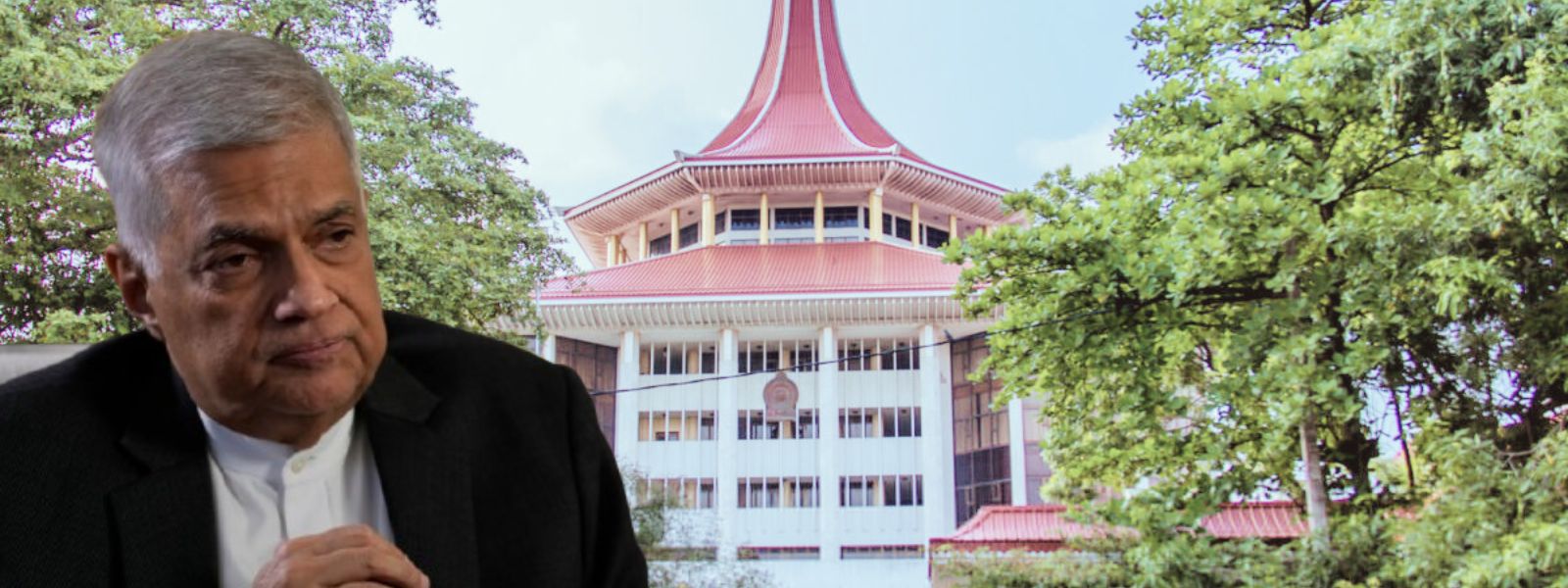.webp)

Civil Society Wins Landmark Case Against Ranil's 2022 Emergency Decree
COLOMBO (News 1st); The Supreme Court of Sri Lanka ruled that the emergency regulations imposed across the country on July 17, 2022, under the Public Security Ordinance by then Acting President Ranil Wickremesinghe, violated fundamental human rights.
The three-judge bench declared that the emergency regulations issued under Section 2 of the Public Security Ordinance were arbitrary and without legal force.
The court further ordered that the regulations be rendered null and void.
In addition to invalidating the regulations, the court ordered the government to pay legal costs to the petitioners.
Fundamental rights petitions filed by prominent civil society representatives were taken up by the Supreme Court, challenging the emergency regulations imposed on July 17, 2022, by then Acting President Ranil Wickremesinghe under Section 2 of the Public Security Ordinance.
The petitions were filed by Dr. Paikiasothy Saravanamuttu on behalf of the Centre for Policy Alternatives, former Human Rights Commissioner Ambika Satkunanathan, and Liberal Youth Movement, represented by Thathprabha Panditha and attorney-at-law Atham Lebbe Aazath and Sandun Thudugala.
The three-member bench comprising Chief Justice Murdhu Fernando, Justices Yasantha Kodagoda, and Arjuna Obeysekera delivered a majority ruling today.
Chief Justice Murdhu Fernando and Justice Kodagoda issued a joint judgment, while Justice Obeysekera delivered a separate opinion.
Justice Kodagoda, delivering the majority decision, stated that Acting President Wickremesinghe had failed to present any justification to the court for the declaration of emergency regulations.
He emphasized that there was no legal basis under Section 2 of the Public Security Ordinance for such a declaration at the time.
During the political unrest and mass protests in 2022 against then-President Gotabaya Rajapaksa, the Supreme Court noted that Rajapaksa resigned and left the country. In response to the prevailing situation, Acting President Ranil Wickremesinghe imposed emergency regulations across the country on July 17 under Section 2 of the Public Security Ordinance.
The court observed that these emergency regulations led to violations of fundamental human rights guaranteed by the Constitution and were arbitrary in nature. Fundamental rights petitions were filed before the Supreme Court requesting that the regulations be declared null and void.
Justice Yasantha Kodagoda, delivering the judgment, stated that both parties presented extensive arguments during the hearing. He emphasized that the court focused on whether the Acting President had properly invoked Section 2 of the Public Security Ordinance to justify the emergency regulations.
The Supreme Court rejected the preliminary objection raised by the Attorney General, who argued that the court lacked jurisdiction to hear the petitions. The bench reaffirmed its responsibility to protect the fundamental rights of citizens and uphold the rule of law.
After a detailed review of the submissions, Justice Kodagoda concluded that the emergency regulations were arbitrary.
He stated that the regulations imposed by Acting President Wickremesinghe violated the fundamental rights enshrined in Article 12 of the Constitution.
The court ordered that the emergency regulations be declared void and directed the government to pay legal costs to the petitioners.
Justice Arjuna Obeysekera, a member of the three-judge Supreme Court bench, delivered his separate opinion in the case concerning the emergency regulations imposed by Acting President Ranil Wickremesinghe in July 2022.
Justice Obeysekera stated that the emergency declaration did not constitute a violation of fundamental human rights. He emphasized that the regulations were issued in response to the prevailing national situation and did not result in any infringement of constitutional rights or arbitrary actions.
Based on this reasoning, Justice Obeysekera concluded that all petitions filed in this context should be dismissed.
Representing the petitioners were attorneys Pulasti Hewamanna, Dr. Gihan Kulatunga, Thishya Weragoda, and President’s Counsel Suren Fernando.
Appearing on behalf of the Attorney General were Senior State Counsel Shaveendra Wickrama, Sampath Bandara, and Deputy Solicitor General Rajiva Gunatilleke.
Other Articles
Featured News





.png )

-799443_550x300.jpg)

-799430_550x300.jpg)
-793492-799417_550x300.jpg)







-797273_550x300.jpg)

















.gif)